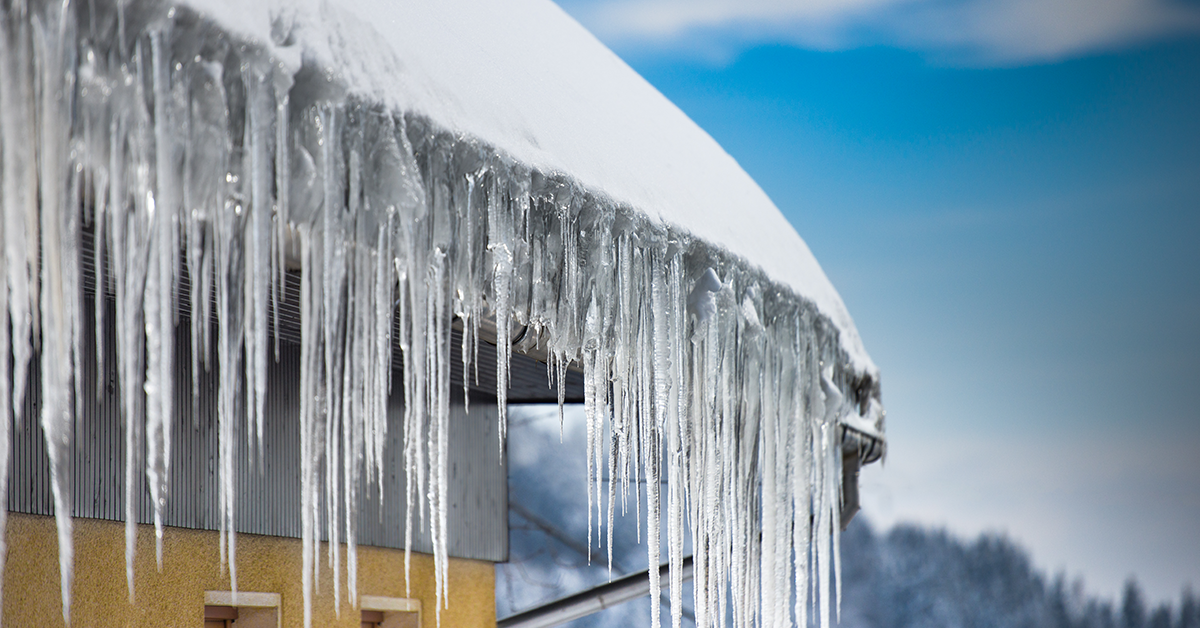Winter-related risks that homeowners face
Winter-related risks that homeowners face

Don't be caught off guard by winter's wrath. Proactive preparation is key to mitigating the risks cold weather poses to your home. Review your insurance coverage, take proactive steps to winterize your property, and be prepared to address all-too-common challenges associated with this time of year.
These are the most consistent insurance claims that policy holders face in the winter.
Top winter insurance claims
Ice dams
When cold weather persists, an ice dam can form on the edge of your roof, blocking melting snow from falling away and refreezing as temperatures drop. This cycle of melting and refreezing can drive forming ice under shingles, and the subsequent melting can then cause leaks inside your home, resulting in severe water damage to walls and ceilings.
Roof and siding damage
Heavy snowfall, sleet, hail and perilous winds can make winter weather unpredictable. Because roofing and siding bear the brunt of this impact, they comprise a significant portion of homeowner losses over the winter months.
Losses from falling trees and limbs
This is one of the most common claims AAA Insurance sees. While structural damages to your home or car caused by falling trees and limbs from heavy snow and wind are obvious losses, you could also be affected by a power loss. To possibly get reimbursed for the cost of lost groceries due to a power outage, check with your insurance agent to see if food spoilage coverage is on your policy.
Frozen pipes
The most common winter insurance claims stem from how the elements affect your home’s exterior, but don’t forget about your plumbing. When pipes freeze, they can burst and cause substantial water damage. The most severe instances happen when homes experience a power outage, resulting in a loss of heat over a significant period of time. So, if you plan on being away from home for an extended period of time, it’s a good idea to shut off the water to your home and drain your pipes.
House fire
This kind of property damage is typically traced back to a secondary heating source. Although many homeowners think of themselves as being responsible with this, individuals that live in multi-family homes, apartments or condos need to also consider if they’re adequately covered if they suffered a loss due to a neighbor’s negligence.

We've got you covered.
Insure your car and home with AAA, the same company that drivers have trusted for more than 120 years.
What you can do to prepare for winter
Fight back against ice damming.
Add extra insulation to your roof to let the indoor heat melt the snow and ice slowly from the inside out. If your roof is prone to ice damming, use a roof rake shortly after a storm to clear as much snow off as you can, even if it’s just around the gutter line. Do not climb onto the roof; if you need a more thorough cleaning, hire a contractor.
Insulate your pipes, doors and windows.
By adding insulation to your hot water pipes, you can minimize the chances those pipes will freeze over and blow. Air leaks near doors or windows should also be eliminated with weather stripping or other door draft stoppers.
Keep an eye on your trees.
Fallen tree branches are one of the most likely – and most damaging – forms of debris you’ll face during cold weather. To prevent damage, trim back any trees that are too close to your home or driveway.
Inspect your ducts and plumbing.
Your furnace and heating ducts need to be in working order to prevent or minimize winter damage. Reach out to a professional if needed for a thorough inspection.
Review your insurance policy
Try to make a habit of reviewing your insurance policy and updating your documentation, including photos, to reflect your home’s condition before the winter. This gives you an opportunity to refresh your understanding of what is included and, accordingly, what actions you might need to take to protect your home.
Most home insurance policies will provide coverage for wind or falling debris that may cause damage to your home.
Damage caused by flooding – which can occur in the winter if the temperature spikes – is not within the scope of a standard policy. Flood insurance must be purchased separately. In insurance terms, a “flood” has a very specific definition and is excluded from a homeowner policy; however, water from a leaking pipe, for example, is typically protected if purchased as part of a policyholder’s coverage.
Liability coverage should cover you in case someone slips and falls on your property.
AAA provides homeowners insurance and much more. Go to AAA.com/Insurance to talk to an agent today.